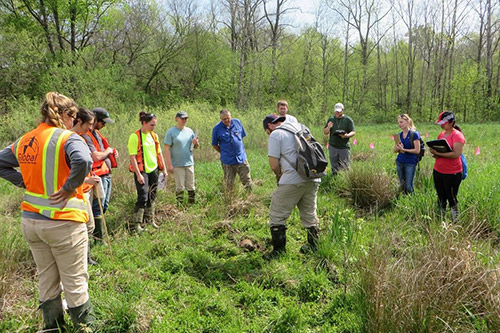MBI offers Vegetation Index of Biotic Integrity (VIBI), VIBI - Floristic Quality (VIBI-FQ), and National Wetland Condition Assessment (NWCA) Vegetation Monitoring Protocols training to prepare attendees for their field wetland assessment work.
What are the VIBI and VIBI-FQ?
The VIBI and VIBI-FQ are biological indices developed for Ohio wetlands. The VIBI uses the 10 attributes of wetland vegetation communities that vary most predictably with human disturbance levels and correspond with levels of ecological condition. The sum of these attributes, known as metrics, result in the VIBI score used to place wetlands in the appropriate regulatory category and define their ecological condition. The VIBI-FQ, which only uses some of the collected data, is also a great assessment tool. One benefit of using the VIBI-FQ is that it can be used for both non-wetland and wetland habitats. Both the VIBI and VIBI-FQ methods are widely used as quantifiable performance standards for mitigation wetlands.
Covid-19 Notification: Due to the recent increase in Covid-19 cases and the corresponding recommendations by the Columbus Health Department and the CDC, we are holding classroom portions of this training virtually via Zoom. Field training will still take place. However, those attending should maintain social distancing and must wear a facemask of appropriate material that completely covers your nose and mouth at all times during in-field training, regardless of vaccination status. We ask that those showing symptoms not attend. Each participant will also need to provide his/her own transporation to and from field sites to avoid unnecessary sharing of vehicles.
Intensive Training
Our VIBI training is an intensive three-day course that will provide a thorough understanding of the development of the VIBI and VIBI-FQ and their uses. Participants will learn the principles behind the monitoring methods and then apply them in the field as they lay out sample plots and gather vegetation community data. Participants will be shown how to use the collected data to develop VIBI and VIBI-FQ scores for the wetlands sampled.
Day One: Classroom Instruction via Zoom (morning) and Field Training (afternoon)
This day will provide a background on the history and development of the VIBI and VIBI-FQ. The attributes of the vegetation community that are the metrics of the VIBI and VIBI-FQ, how they are measured and scored, and why the VIBI and VIBI-FQ are such excellent tools for determining the ecological condition of wetlands will be covered. The afternoon of the first day will be spent at a local forested wetland where particpants will learn how to set up a standard sampling plot and collect the specific information needed to develop a VIBI score for a forested wetland.
Day Two: Field Training
Participants will visit local wetlands, set up monitoring plots, and collect all the data needed to generate VIBI and VIBI-FQ scores for the wetlands sampled. Each participant will be actively involved in establishing sample plots, sampling vegetation, recording information, and learning step by step the VIBI and VIBI-FQ protocols.
Day Three: Classroom Instruction via Zoom
This day will include instruction on how to use the data collected in the field to calculate VIBI and VIBI-FQ scores. An Excel spreadsheet will be used to compute metric and total VIBI and VIBI-FQ scores, and the underlying mathematical procedures used to develop the metric scores will be fully explained. Any remaining questions about any aspect of the VIBI evaluation process will be discussed and answered.
Recommended Background
It is recommended that participants have some experience in wetland plant identification and vegetation sampling. However, the instructor and often other participants have strong botany skills and will help others in the field with plant identifications. During the full day in the field the instructor will ensure that everyone fully understands the monitoring protocols and will provide insights to those less experienced with plant identifications. Therefore, it is not necessary to have advanced skills in plant taxonomy to gain significant benefit from this training.
Results
This course will provide participants with the knowledge needed to be confident in their ability to understand and conduct VIBI and VIBI-FQ evaluations on their own. If questions arise as former participants begin conducting their own VIBI assessments, they will have gained the skills to know how and where to seek the information needed to provide those answers. Participants will receive a certificate documenting successful course completion.
* This course is certified by the Society of Wetland Scientists Professional Certification Program.

